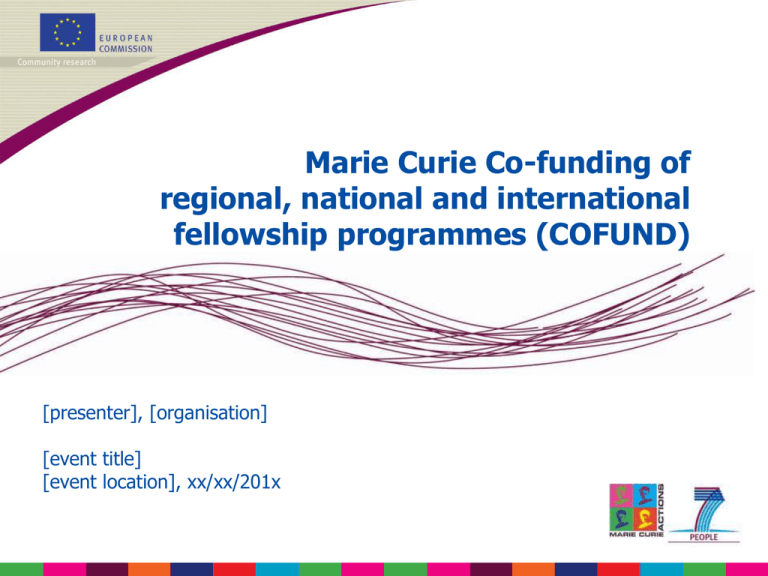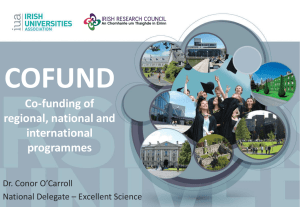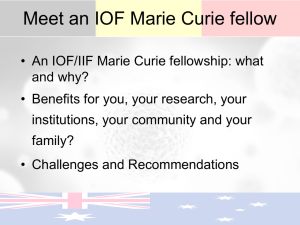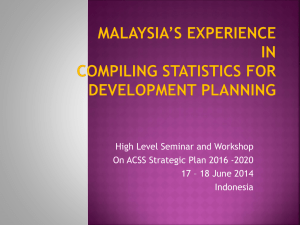Commission Presentation
advertisement

Marie Curie Co-funding of regional, national and international fellowship programmes (COFUND) [presenter], [organisation] [event title] [event location], xx/xx/201x Content • Marie Curie Actions - introduction • COFUND: • • • • • • Objectives Principles and rules Evaluation and selection procedure State-of-play: results of previous calls Best practises: examples of co-funded Fellowship Programmes Further information FP7 (2007-2013) FP7 = EU’s research funding instrument Budget : Billion €50.5 4 Programmes: Cooperation, Ideas, People, Capacities FP7 breakdown (€ + Euratom) (+ Joint Research Centre million) Ideas: B €7.51 Cooperation: B€ 32.5 People : B €4.75 Marie Curie Actions JRC: €1.75 JRC : M€B 1750 Euratom: B €2.75 Nuclear research Capacities: B €4.1 Marie Curie Actions A dedicated programme for structuring training, mobility and career development Objectives: • • • • Human resources potential in R&D in Europe Stimulate people to enter into the profession of researcher Encouraging researchers to stay in Europe Attracting researchers from around the world One main condition to be eligible: Mobility • • • • • Employment contracts with full social rights Addressed to researchers at all stages of their careers Adequate working conditions and attractive salaries Peer-reviewed international evaluation European (and international) prestige Geographical Sectorial “People” Programme ~€4.75 Billion = Marie Curie Actions Initial training (~40% budget) Initial Training Networks (ITN) Life-long training and career development (~25-30% budget) Intra-European Fellowships (IEF)/ Career Integration Grants (CIG) Co-funding of regional/national/international programmes (COFUND); Industry dimension (~5-10% budget) Industry-Academia Partnerships and Pathways (IAPP) World fellowship (~25% budget) International Outgoing & Incoming Fellowships (IOF & IIF); International Staff Exchange Scheme (IRSES) Policy support actions (~1% budget) Mobility and career enhancement actions Marie Curie Actions Applicants Profile of recruited researchers Individual researchers OIF > 10 years IIF Post-docs (ER) ERG > 4 years IRG < 4 years *MER: More Experienced Researcher Research funding bodies IEF Senior Post-docs (MER*) Post-graduates (ESR) Industry/Research Institutions IAPP IRSES ITN COFUND Initial Training Networks (ITN) Aims to improve career perspectives of early stage researchers in both public & private sector International networks of participants from public & private sector Joint research training programme Complementary skills acquisition: entrepreneurship, management, IPR, grant writing, communication Eligible researchers : Nationals from any country Mainly Early-Stage Researchers (ESR): > 80% - less than 4 years experience in research Experienced researchers (ER):< 20% - more than 4 years experience in research Community Contribution Attractive salaries of recruited researchers Research and networking costs Organisation of short training events (workshops, seminars, summer schools and conferences) Industry–Academia Partnerships & Pathways (IAPP) Foster research collaboration between non-commercial (public) research organisations & commercial enterprises Based on common research project Intersectoral mobility & skills exchange Staff secondments & recruitments of experienced researchers Funding for research costs & networking activities Eligible researchers Staff exchange – secondments : 2 to 24 months Recruitment (optional) : 12 to 24 months Community contribution Staff secondments and recruitment of experienced researchers (optional) Research and networking costs Specific small equipment for SMEs: <10% total contribution International Research Staff Exchange Scheme (IRSES) Participant rules : At least 2 independent research organisations in two different MS/AC One or more organisations in TC Additional partners from any sector and from any other country welcome Joint multi-annual programmes of 24-48 months Eligible researchers : Research staff mainly, but also technical and management staff Min. 1 month - max. 12 months/researcher Staff is seconded (not recruited) Community contribution : Balanced exchange of EU/International researchers Subsistence/travel allowance for outgoing European researchers € 1800/month per researcher Case by case: subsistence/travel allowance incoming ICPC/ENP Life Long Training and Career Development Intra-European Fellowships for career development (IEF) 12 to 24 months (full-time) period Any nationals working/living in MS*/AC** moving to another MS/AC Mobility requirement at the deadline of the call (definition) Career Integration Grants (CIG) Financial contribution of 25 000 €/year during 2-4 years Host institution within MS/AC, including country of origin Research costs, including salary of researchers or assistants MS*: Member States AC**: Associated Countries with science and technology cooperation agreements that involved contributing to the framework programme budget World Fellowships International Outgoing Fellowships for career development (IOF) 12-24 months period in a TC plus 12 months of compulsory return phase in MS/AC For Nationals of MS/AC International Incoming Fellowships (IIF) 12-24 months period in MS/AC Third country nationals coming from outside Europe Possible return phase to country of origin (12 months) COFUND Global objective COFUND supports existing and new regional, national and international fellowship programmes – to increase transnational mobility for training and career development of experienced researchers – to improve the working and employment conditions of researchers in Europe. COFUND Impacts – Numerical impact and leverage effect • 2.5 x more individual Marie Curie fellowships • Creation of new fellowship programmes – Encourages regional and national fellowship programmes to open for transnational mobility – Structuring the European Research Area (ERA): • selection processes based on competition, transparent selection criteria, composition of selection committee, international peer review • Improved working conditions for researchers (employment contracts with full social rights) COFUND Charter and Code – Working conditions of researchers – Transparency of recruitment processes – Career development COFUND Who can apply? – Public bodies – Private bodies with public mission – International organisations responsible for funding and managing fellowships or research training programmes For example: ministries, research academies, research funding agencies, universities COFUND What are the eligibility criteria? (1) – Fellowship Programmes can only fund experienced researchers; they must be either • doctorate holders • or have >4 years research experience – Researchers have to show transnational mobility: • incoming from another country • outgoing to another country • (re)integration into research employment in Europe after period of transnational mobility COFUND What are the eligibility criteria? (2) – Beneficiaries must be established in a EU Member State or Associated Country to FP7 – COFUND allows: • Creation of new transnational fellowship programmes • Opening of existing programmes to transnational mobility • Increasing number of transnational fellowships currently awarded by an existing programme • Improving working/research conditions of fellows COFUND What does the funding cover? – EU contribution: 40% of fellowship costs – Max. € 10 million per organisation per call – Duration: 24-60 months – Supported fellowship programmes receive label co- funded by Marie Curie actions – Researchers selected by fellowship programmes are Marie Curie Fellows COFUND Which topics can be funded? – Bottom-up approach: all domains of research and technological development are eligible – Fellowship programmes can cover several or all fields of research or can be restricted to a specific domain – However, programmes should have sufficient impact in the specific scientific field(s) COFUND Evaluations of fellowship programmes – Organisations managing fellowship programmes send application to yearly call for proposals – Proposals are evaluated in independent peer review, based on pre-established criteria – Proposals are evaluated in two separate panels: • Panel A: existing transnational fellowship programmes (including those opening for the first time for transnational mobility) • Panel B: new transnational fellowship programmes COFUND Evaluation criteria (1) – Quality of the selection process for the fellows under the programme (30% weight) • Transparency of selection process* • Composition and organisation of selection committee* • Criteria and merit of judging merit* *see Charter and Code COFUND Evaluation criteria (2) – Implementation - Management of the programme (30% weight) • Appointment conditions of selected fellows* • Quality of the programme management • Client-friendliness towards applicant researchers • Administrative capacity to implement the programme • Appropriateness of the scale of the programme • Future development of the programme *see Charter and Code COFUND Evaluation criteria (3) – Relevance and Impact to “Life long training and Career development” (40% weight) • Openness of programme to transnational mobility • Contribution to diverse career development of researchers (broadening or deepening) • Career development support for fellows* • Equal opportunities (including possibility to resume research career after break)* • Relevance for ERA of research field covered by programme’s calls • Impact of programme to development of researchers’ careers in the ERA *see Charter and Code COFUND What happens after the evaluations? – If proposals are selected for funding, Research Executive Agency (REA) negotiates yearly flat-rate EU contribution per fellow-year – Organisations sign grant agreement with REA – Organisations run co-funded fellowship programmes independently from EC and REA, with own application/selection rules and financial contribution rates to fellows – Co-funded programmes report annually to REA – Financial reporting exclusively based on flat-rates, not on actual costs COFUND state of play Call Budget M€ N° of eligible proposals N° of proposals retained for funding Success rate Co-funded Fellowships FP7-PEOPLE2007-2-3COFUND 65 45 24 53.3% 1568 FP7-PEOPLECOFUND-2008 75 35 26 74.3% ~1800 (estimated) FP7-PEOPLE2010-COFUND 75 53 expected 30 ~56.6% ~1800 (estimated) G Ita ly er m an y Fr an ce Ire la nd Be lg iu m Sw ed en Au st N ria et h U er ni la te nd d s Ki ng do m Po rtu ga l H un ga C ry ze ch R ep . Es to ni Lu a xe m bu rg Ic el an d Sp ai Sw n itz er la nd # proposals selected for funding COFUND state of play 20 18 16 international organisations 14 12 10 8 6 4 2 0 # proposals retained for funding in COFUND calls COFUND state of play 40 Universities 35 Research organisations (excluding universities) Funding agencies 30 25 20 15 10 5 0 regional organisations national organisations international organisations Sp ai n Ita Fr ly Sw a n itz ce er l G and er m an Tu y rk Be e y lg iu m Ire la Sw n d ed e Au n st Po ria rtu g Es a l to ni H un a L Th ux gar y e e N mb U eth urg ni te erla d Ki nds ng do Al m ba n Bu ia l C ze gar ch ia R ep C . ro at Ic ia el an N d or wa y # proposals COFUND state of play 25 20 universities research organisations (excl. universities) Funding agencies 15 10 5 0 Sp ai n Ita F ly Sw ran itz ce er l G and er m an Tu y rk Be e y lg iu m Ire la Sw n d ed e Au n s Po tria rtu g Es a l to H nia un Th Lux gar y e e N mb e u U ni the rg te rla d Ki nds ng do Al m ba Bu nia l C ze gar ch ia R ep C . ro a Ic tia el an N d or wa y # proposals COFUND state of play 25 international organisations 20 national organisations regional organisations (incl. universities) 15 10 5 0 Sp ai n Ita Fr ly Sw a n itz ce er l G and er m an Tu y rk Be e y lg iu m Ire la Sw n d ed e Au n st Po ria rtu g Es a l to ni H un a L Th ux gar y e e N mb e ur t U ni her g te d land Ki ng s do Al m ba n Bu ia l C ze gar ch ia R ep C . ro at Ic ia el an N d or wa y # proposals COFUND state of play 25 20 15 ECO-SOC ENG-MAT-PHY LIFE MULTI 10 5 0 COFUND state of play 1400 co-funded Fellow-years (1st call) 1200 1000 800 600 400 200 0 outgoing incoming type of m obility re-integration COFUND state of play 70 new fellowhip programmes 60 existing fellowhip programmes # proposals 50 40 30 20 10 0 1st call 2nd call 3rd call COFUND Programmes – Examples regional funding agencies (1) – Czech Republic: South Moravian Region – Spain: • Catalonia (AGAUR) • Bizkaia (Bizkaia:xede) • Galicia • Aragón • Basque (IKERBASQUE) – Italy: Provincia Autonoma di Trento – UK: Royal Society of Edinburgh COFUND Programmes – Examples regional funding agencies (2) – TRENTINO Fellowship Programme: • Existing fellowship programme since 2003 (only incoming) • COFUND allowed: – increase in number of incoming fellowships (30 Fellow-years) – introduction of outgoing (65 Fellow-years) and reintegration scheme (25 Fellow-years) – improve the fellows' working conditions (employment contracts) • EU contribution: € 2.66 Mio COFUND Programmes – Examples national funding agencies (1) – Austria: FWF – Belgium: • Belgian Science Policy Office • F.W.O. – Germany: • Alexander von Humboldt Stiftung • Gerda Henkel Stiftung • Stiftung Wissenschaft und Politik – Estonian Science Foundation – Hungary: National Office for Research and Technology COFUND Programmes – Examples national funding agencies (2) – Ireland: • Health Research Board • Irish Research Council for Science, Engineering & Techn. • Irish Research Council for the Humanities and Social Sci. • Science Foundation Ireland – Iceland: The Icelandic Centre for Research – Italian Association for Cancer Research – Luxemburg: National Research Fund – The Netherlands: N.W.O – Portugal: Fundação para a Ciência e a tecnologia COFUND Programmes – Examples national funding agencies (3) – Schrödinger Fellows (FWF, Austria): • Largest Outgoing Programme in Austria for basic research at postdoc level open to all disciplines and destinations. • 117 Fellow-years outgoing researchers, fellowships up to 2 years • COFUND funding used to introduce reintegration phase (25 Fellow-years), fellowships up to 1 year, research cost indicative contribution of € 8.000 year • Total EU contribution € 2.4 Mio COFUND Programmes – Examples regional research organisations (1) – Belgium: VIB – Switzerland: Zürich-Basel plant Science Center – Spain: • Centre for Genomic Regulation (CRG) • Ciber de Diabetes y Enfermedades Metabolicas Asociadas • August Pi i Sunyer Biomedical Research Institute • Institut de Ciencies Fotoniques • Institute for Research in Biomedicine • Universitari Vall D‘Hebron – Italy: • Fondazione Bruno Kessler • Fondazione Centro San Raffaele del Monte Tabor • Istituto Superiore di Sanità COFUND Programmes – Examples regional research organisations (2) – BIOTRACK Programme of IDIBAPS: • IDIBAPS: biomedical research centre located at University of Barcelona's School of Medicine and Hospital Clínic • 72 incoming Fellow-Years • 35 outgoing Fellow-Years • 20 re-integration Fellow-Years • EU contribution: € 2.9 Mio COFUND Programmes – Examples national research organisations (1) – Switzerland: EMPA – Eidgenössische Materialprüfungs- und Forschungsanstalt – Spain: • TECNALIA • Fundación CNIC Carlos III – France: CEA – Ireland: National Biophotonics and Imaging Platform – Italy: Istituto Nazionale di Alta Matematica COFUND Programmes – Examples national research organisations (1) – Eurotalents Fellowship Programme of the Commissariat à l’énergie atomique et aux énergies alternatives (CEA), France • Scientific fields: Energy, environment and climate change, Life sciences and biotechnology, Microelectronics, nanosciences and nanotechnologies, high performance computing, high energy physics, high energy density physics and physics of the universe. • Incoming fellowships: 129 fellow-Years • Outgoing fellowships: 14 fellow-years • EU contribution: € 5 Mio COFUND Programmes – Examples international organisations (1) – European Respiratory Society (ERS) – Central European Initiative (CEI) – European Molecular Biology Organization (EMBO) – European Research Consortium for Informatics and Mathematics (ERCIM) – European Southern Observatory (ESO) – European Organization for Nuclear Research (CERN) – International Agency for Research on Cancer (IARC) – European Molecular Biology Laboratory (EMBL) – European Institutes for Advanced Study COFUND Programmes – Examples international organisations (2) – RESPIRE Programme of the European Respiratory Society (ERS): • ERS promotes research into respiratory diseases, including asthma, cystic fibrosis, COPD, lung cancer • Existing fellowship programme in pneumology and respiratory science since 1998 • COFUND used to increase number of fellowships to 18 over three years period • EU contribution: € 290 k COFUND Programmes – Examples international organisations (3) – European Southern Observatory Fellowship Programme for the Atacama Large Millimetre/submillimetre Array (ALMA) • Incoming fellowships: 24 fellow-years • Outgoing fellowships: 24 fellow-years • Re-integration fellowships: 21 fellow-years • EU contribution: € 1.79 Mio COFUND Programmes – Examples universities (1) – Belgium: Université Catholique de Louvain – Switzerland: • Universät Bern • Université Genève • ETH Zürich – Germany: FU Berlin – Spain: • Universidad de Malaga • Universidad de Murcia • Universidad Politecnica de Madrid COFUND Programmes – Examples universities (2) – France: • Université Européenne de Bretagne • UniverSud Paris – Sweden: • Karolinska Institutet – UK • University of Durham COFUND Programmes – Examples universities (2) – International Fellowship Program on Integrative Kidney Physiology and Pathophysiology, Universität Bern – Programme supports postdocs to conduct research at one of the five medical university faculties in Switzerland (Basel, Bern, Geneva, Lausanne and Zürich) for two years. – EU contribution: € 1.26 Mio COFUND in WP 2011 – Next call (indicative): FP7-PEOPLE2011-COFUND • Date of publication: 20 October 2010 • Deadline: 17 February 2011 • Budget: EUR 90 million COFUND more information List of COFUND Fellowship Programmes: http://cordis.europa.eu/fp7/people/cofund_en.html Information on Marie Curie Actions: http://ec.europa.eu/research/mariecurieactions/ NEW: EURAXESS Fellowship Programmes Portal – http://ec.europa.eu/euraxess -> go to “Jobs” – “Fellowship Programmes“ Portal: database of regional, national and international research fellowship programmes – Possibility to search for fellowship opportunities according to specific criteria How are the Marie Curie actions implemented? The Research Executive Agency Evaluation of the proposals day to day management of FP7 Marie Curie projects More information [E-mail address presenter]



